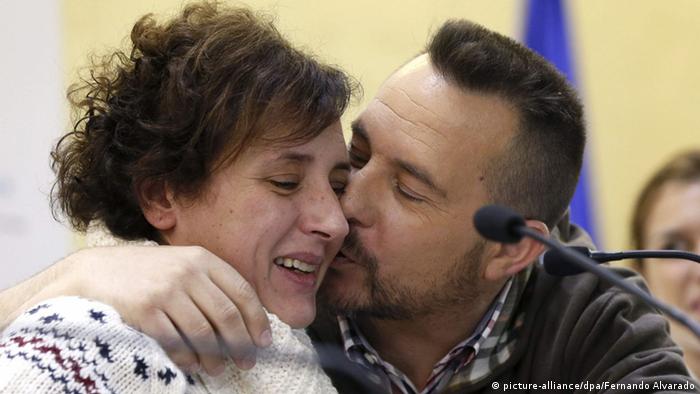Teresa Romero, the first person known to have contracted Ebola outside West Africa, has been released from a hospital in Madrid. She has vowed to help save others by donating her blood for medical use.
The first person known to have contracted the deadly Ebola virus outside of West Africa was released from Carlos III hospital in the Spanish capital of Madrid on Wednesday. Teresa Romero, a Spanish nurse, caught Ebola while treating two infected Spanish missionaries in Madrid. Manuel Garcia Viejo had fallen ill in Sierra Leone, while Miguel Pajares became sick in Liberia. Both missionaries were repatriated to Spain, where they died of the virus.
Family memories
On her release, Romero, who was declared free of Ebola two weeks ago, said that she was still very weak, but doctors believe she will make a full recovery.
"When I felt I was dying I would cling to my memories, to my family and my husband, I was isolated and I did not have any contact with the exterior except with Javier by telephone," Romero recalled in a statement, surrounded by doctors and her husband Javier Limon.
"When I felt I was dying I would cling to my memories, to my family and my husband, I was isolated and I did not have any contact with the exterior except with Javier by telephone," Romero recalled in a statement, surrounded by doctors and her husband Javier Limon.
After having been treated with blood plasma from a missionary nun who had contracted Ebola in Liberia, Romero has now vowed to donate her blood until she was "drained dry."
"If my being infected is good for something, to learn more about the disease, or if my blood can be used to cure other people, I'll be available to help," Romero said.
Safety standards
While she said she was still unsure about how the hemorrhagic virus was transmitted, the 44-year-old previously recalled touching a glove to her face after leaving Pajares' hospital room. Ebola is contracted through bodily fluids.
The safety standards and training at Carlos III hospital have come under fire since Romero was taken ill, with Spanish doctors and nurses previously holding daily protests against what they call shoddy safety measures, inadequate quarantine equipment and budget cuts to public health - all of which, they say, may have left them vulnerable to the deadly virus.
Improve and coordinate efforts
The European Commission announced Wednesday that senior EU officials would travel next week to West Africa to see how to improve and coordinate European efforts in fighting the Ebola virus. According to the World Health Organization (WHO), almost 5,000 people have now died in the West African Ebola-hit countries, since the outbreak began in March.


No comments :
Post a Comment